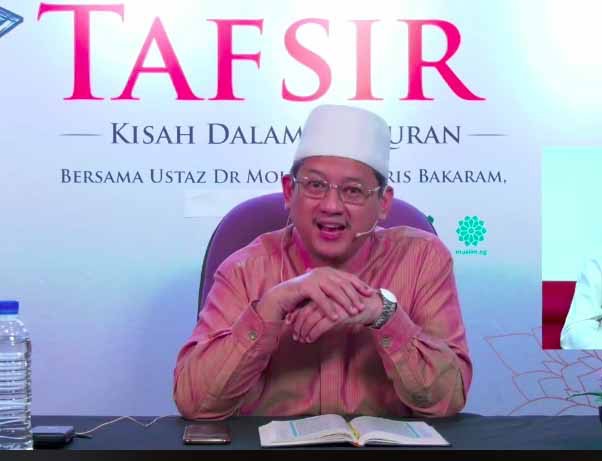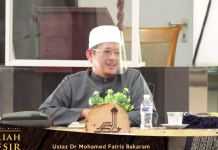This article is a summary of takeaways from Ustaz Dr Mohamed Fatris Bakaram’s Tafsir Online Lecture on 28th June 2020. Summaries of previous lectures on Surah Maryam and Surah Taha can be found here. This lecture is a continuation of the previous lecture after Surah Al Anbiya’ verses 87 to 88.
The Du’a of Prophet Zakariya
وَزَكَرِيَّا إِذْ نَادَىٰ رَبَّهُ رَبِّ لَا تَذَرْنِي فَرْدًا وَأَنتَ خَيْرُ الْوَارِثِينَ
And (remember) Zakariya, when he cried to his Lord, “O my Lord! Do not leave me alone, while You are the best of inheritors.” [21:89]
We mentioned Prophet Zakariya before when we went through his story in the Tafsir of Surah Maryam Verses 12 to 15. We learnt that Prophet Zakariya was an elderly man, having grown old without any children. His own wife was infertile. In some narrations it was mentioned that Prophet Zakariya was about 100 years old, some say even more than that.
Prophet Zakariya had made this du’a:
رَبِّ لَا تَذَرْنِي فَرْدًا وَأَنتَ خَيْرُ الْوَارِثِينَ
“O my Lord! Do not leave me alone, while You are the best of inheritors.”
Do Not Leave Me Alone
What Prophet Zakariya meant when he said, “do not leave me alone”, was not that he feared being banished by his people just as Prophet Lut had been. Prophet Zakariya was in fact well-respected by his people. However, being childless, he felt lonely. This is the Fitrah or nature of human beings. What married couple would not want children or would not feel lonely and empty without children of their own? The laughter and antics of small children bring about joy and peace in our hearts. Even when our child cries, we will feel happy. Imagine a parent whose child does not even cry, the parent would get genuinely concerned! This was why Prophet Zakariya felt lonely and empty, as he made this du’a to Allah SWT.
I am reminded of a Malay movie I watched on TV a couple of months back. Towards the end of the movie, the protagonist, a righteous man, was battling with magicians. He had been tied up and tortured and in his state of helplessness, he cried out this du’a of Prophet Zakariya screaming, “Rabbi laa tazharnii fardan! O my Lord, do not leave me alone!” repeatedly. I guess if we look at it from the literal perspective this du’a was applicable for his situation. He did not want Allah SWT to leave him alone. However, if we look back at the context of this du’a, “alone” in Prophet Zakariya’s situation meant ‘childless’. So if you were to ask me if that du’a should be used in the context of when you are facing your enemies, then I have to say truthfully, wallahu’alam bissawaab; I do not know, you will need to ask someone who is an expert.
The Best of Inheritors
Now the second part of this du’a translates to “whereas You (Allah SWT) are the best of inheritors.” What did Prophet Zakariya mean by this phrase? The word warith, meaning ‘inheritor’, refers to someone who receives something that he did not own, from its owner after the owner is no longer around.
So, amongst the concerns of someone who does not have any progeny is that, if he were to die, there would not be someone worthy of inheriting his wealth. They may have a spouse to inherit from them but having a spouse and having progeny is not the same. Even in the Fara’id ruling, we see that a widow or widower does not inherit all of the deceased’s inheritance, depending on whether or not there are children present.
All parents hope to be able to provide for their children for as long as they are still unable to provide for themselves. Even if they were going to die during their children’s childhood, they want their children to at least benefit from the inheritance that they leave behind. And if their children have reached adulthood, parents wish for their wealth to be inherited as a gift for their children.
In his loneliness and yearning for a child, Prophet Zakariya perhaps questioned himself, asking who his inheritors may be. Even so, in making his du’a to Allah SWT, Prophet Zakariya maintained his Adab with Allah. His faith did not falter. He did not claim that he did not have any inheritors at all, instead, he acknowledged that Allah SWT is in fact his inheritor, and the best of all possible inheritors. This is something that we, as Allah SWT’s servants often forget, we forget that Allah SWT, the Creator of all things, is our first and most important inheritor. We come from Him and will return to Him. More than just our wealth, our whole being belongs to Him and will end up with Him. Allah SWT owns all of our wealth; as our primary inheritor, it is up to Allah SWT to distribute it after we die.
Even though our wealth belongs to Allah SWT, we will still be questioned about how we manage it in our lives. There are people who plot and plan so that certain people in their family do not get their allocated portion of inheritance. I give you an example of a man who divorced his first wife and remarries. Due to his cutting of ties with his first wife, he refuses to give his children from her even a small portion of his own inheritance. He hopes for his second wife and the children he dotes on with her to inherit all that he owns. In his hatred and greed, he ends up being cruel to his own progeny, who were innocent and did not play a part in his conflict with his ex-wife. A person like him has completely forgotten about his wealth belonging to Allah SWT. The faraid law is put in place to ensure that every person carries out his duty in fulfilling the rights of his family even after his death.
There are of course exceptions and when the need arises, certain exceptional circumstances can happen. I give an example of an elderly couple: an unemployed man and his housewife wife. The husband is no longer able to work due to his poor health conditions and physical state. The wife had never worked in her life and was not going to start in her present age. They have a single son who is irresponsible and cruel to them. He would beat his parents up, insult and curse them and commit crimes, going in and out of prison. As a father, the elderly man worries for his wife, knowing that his son would not fulfil his duties of caring for her. If we follow the faraid law, his wife will only inherit and eighth of his wealth whereas the remainder (seven-eighths) would go to his son.
Allah SWT had made this ruling on the basis that the child would be the one who is expected to take care of his mother after the father’s death, bearing the cost of housing, clothing, and feeding her. In exceptional cases like this one, there are processes that can be done to ensure that the child’s mother inherits a larger proportion of his wealth. I advise each of you who is in a similar situation to talk to our asatizah and ask them about “hibah” and how to carry this out. When it comes to wealth and inheritance, do not forget that Allah SWT is our primary inheritor and He will sort it out and determine where the wealth will go.
Prophet Zakariya’s Prayers Were Answered
فَاسْتَجَبْنَا لَهُ وَوَهَبْنَا لَهُ يَحْيَىٰ وَأَصْلَحْنَا لَهُ زَوْجَهُ ۚ إِنَّهُمْ كَانُوا يُسَارِعُونَ فِي الْخَيْرَاتِ وَيَدْعُونَنَا رَغَبًا وَرَهَبًا ۖ وَكَانُوا لَنَا خَاشِعِينَ
So We answered his prayer, granted him Yahya, and amended the condition of his wife. Indeed, they used to race in doing good, and call upon Us with hope and fear, totally humbling themselves before Us. [21:90]
If you remember, in the lesson of Surah Ali-Imran, we discussed how when the news of Yahya came to Prophet Zakariya, he had spontaneously asked, “O Allah, how am I going to have a child? I am old and my wife is barren!”. Yet Allah SWT had answered his du’a. Don’t you think this story is beautiful, my dear brothers and sisters? Prophet Zakariya had accepted whole-heartedly that he was not going to be a father. He had Redha with Allah’s plans and knew that Allah SWT is the best of inheritors. Yet, he was lonely without a child, and so he asked that he not be left alone.
When Allah SWT announced the coming of Yahya, Prophet Zakariya was surprised and thought it strange that he would be able to bear a child. Based on human logic, an old man and a barren woman cannot possibly bear children. Even so, Prophet Yahya did not stop making du’a.
Allah SWT is fully capable of making anything happen, even the seemingly impossible. All He SWT has to do is to say “be”, and it will be. Prophet Zakariya looked at his circumstances and did not let them restrict him from making requests from Allah. When the results came, he was confused and surprised, but Allah SWT assured him that it was indeed part of His Plans. Allah SWT cured the wife’s infertility problems so that Prophet Yahya could be born in a healthy state.
Three Conditions for The Acceptance of Zakariya’s Du’a
Allah SWT described Prophet Zakariya and his wife as people who hastened to do good. The word “khairaat” is the plural of “khair”, meaning goodness. They did not just do a bit of good; all of their lives, they did a lot of good. They served, helped and guided people, they brought people joy and comfort. They did all of these in a state of immediacy and quickness, without delaying any action.
Prophet Zakariya and his wife used to make du’a in two conditions: (1) “Raghaban”, meaning ‘hoping for goodness’ and (2) “RaHaban”, meaning ‘in fear of punishment’. This was what the hearts of Prophet Zakariya and his wife were like. Even in old age, they never gave up hope or fear. People who learn Tasawwuf, or the knowledge of the soul, use the terms “Raja’ (hope)” and “Khauf (fear)” to describe this.
“Khusyu’” translates to humility. It refers to someone who is not proud or arrogant, someone who is not boastful and does not think too highly of himself. Prophet Zakariya was respected and loved by his people and yet he was not proud.
So these were the three conditions for the acceptance of Prophet Zakariya’s du’a:
(1) كَانُوا يُسَارِعُونَ فِي الْخَيْرَاتِ
They raced to do much good
(2) وَيَدْعُونَنَا رَغَبًا وَرَهَبًا
They made du’a full of hope (for Allah’s Mercy, Goodness and Pleasure) and fear (of Allah’s Punishment, Hatred and Displeasure)
(3) وَكَانُوا لَنَا خَاشِعِينَ
They were humble towards Allah
So my dearest brothers and sisters, if there is something that you desire, then ask for it. Do not complain and feel resigned because you have not yet received what you hope for. Make du’a and ensure that you fulfil these three conditions. Firstly, do good. Do good in the hopes of earning Allah SWT’s Pleasure. If you are busy doing bad deeds in this life, then how can you expect to be granted your du’as? Secondly, make du’a with hearts full of hope while at the same time, being full of fear. Surrender the outcome to Allah SWT but take care of your heart. Have hope in Allah SWT but do not let go of your fear of Him.
Lastly, do not ever become proud. Regardless of your status and wealth, never ever think too highly of yourself. You do not want Allah SWT to reject your du’as because of your pride. Neither do you want to be granted your du’as, only for them to be a form of Istidraj against you rather than a blessing. Istidraj is a form of supposed blessing that causes a servant of Allah to become lost in forgetfulness, heedlessness, and to stay a victim of their own arrogance. We seek Allah’s protection from making us amongst them, ameen.
Lessons from The Du’as Of The Prophets
As you have seen in this story and the ones of previous prophets, the du’as of the Prophets are narrated in the Qur’an to be a means for us to learn from them. We learnt from the du’as of prophet Ayyub who was “touched” by illness. We learnt from the du’a of Prophet Yunus, who did not make any requests and yet got his desires fulfilled. Bear these du’as in mind and put them into practice, dear brothers and sisters.
Prophet Ayyub AS had made a du’a because of the pain and loss he was being confronted with in his life. Prophet Yunus AS had made du’a in a state of danger, where his own life was being risked. Prophet Zakariya was not going through any big trial or loss, he was not in danger; he was someone who was longing for something with a heart full of hope, even though his requests seemed to defy human logic.
When you are going through difficulties in life, make du’a to Allah. When you are facing danger or harm, make du’a to Allah. When there are things you desire that are good for you, be it in this world or the next, then make du’a to Allah.
The phrase “fastajabnaa lahu”, meaning ‘so we answered his prayer’, is repeated in this Surah. When it came to the du’a of Prophet Yunus in verse 88, Allah SWT used this phrase. Similarly, in verse 84, for Prophet Ayyub’s du’a, this phrase was used. Allah SWT answered all three of these Prophets’ du’as. My own du’as, Alhamdulillah many of them have been answered already. The ones that have not, I am sure Allah SWT will replace with something even better. Dearest brothers and sisters, hold on firmly to your faith in Allah. Trust him to answer your prayers. We hope that someday, Allah will say “fastajabnaa lahu” while referring to us, saying that he has answered our prayers. Ameen, ya Rabbal ‘Alameen.
The Du’a of Prophet Isa’s Grandmother
وَالَّتِي أَحْصَنَتْ فَرْجَهَا فَنَفَخْنَا فِيهَا مِن رُّوحِنَا وَجَعَلْنَاهَا وَابْنَهَا آيَةً لِّلْعَالَمِينَ
And (remember) she who guarded her chastity, so We breathed into her a Ruh, making her and her son a sign for all the worlds. [21:91]
This verse is referring to Sayidatina Maryam AS, a woman who modestly defended her chastity. She was honoured and pure, she protected herself from mixing with men. By Allah SWT’s Will, Sayidatina Maryam became pregnant with Prophet Isa AS. Both of them were signs for all of mankind.
What is the link between this story and the other stories of Surah Al-Anbiya’? The past three stories had been stories relating to the du’as of the prophets. The story of Sayidatina Maryam too has something to do with a du’a. If you refer back to our previous lessons of Surah Ali-Imran, you would remember the story of Sayidatina Maryam and Prophet Zakariya. Sayidatina Maryam’s mother had in fact been the sister of Prophet Zakariya AS’ wife; Sayidatina Maryam was Prophet Zakariya’s niece.
Sayidatina Maryam’s mother, during her pregnancy, had made a du’a telling Allah SWT that she has dedicated her daughter to be 100% of service to the religion. In Surah Ali-Imran, we heard about how surprised Sayidatina Maryam AS’ mother had been, to discover that she had given birth to a daughter. Allah SWT declares that He knew better what had been in her womb. Why was Sayidatina Maryam’s mother shocked to see a female baby?
During that era, the people in service of the religion where completely men. The women were not known to serve the mosques, they were never dedicated to the religious service. Sayidatina Maryam’s mother had made the Nazar and dedicated her child to the religion thinking that she would get a son. Allah SWT did not answer her prayer by directly granting her a son in the service of the religion; instead, he gave her something better.
How Allah SWT Answers Du’as
We saw that Prophet Ayyub AS’ du’a had been answered directly. His hardships were taken away and his losses replaced. Prophet Yunus AS had made du’a hoping for relief from danger. He was saved from danger in a way that matched his expectations. Prophet Zakariya had asked for a child and was granted one, just as he had requested.
Sayidatina Maryam’s mother’s du’a was not answered in a way she had hoped for. However, Allah SWT does not disappoint, Allah SWT gave her something worth even more than she could have ever dreamed of. Sayidatina Maryam AS turned out to become the mother of a miracle son, an honourable messenger of Allah, Prophet Isa AS. Sayidatina Maryam herself became a woman of honour and chastity, someone who is amongst the most honoured women of all time. The leaders of the women in Paradise are: Sayidatina Mariyam AS, Sayidatina Fatima RA, Sayidatina Khadijah RA, and Sayidatina Asiyah RA, the wife of Firaun.
The same thing applies for us. Do not ever give up hopes on Allah SWT. Whatever you want, ask of Allah SWT. Have full conviction and trust in Allah SWT. Do not become someone who is proud with Allah SWT. Do not ever think that, “Allah SWT would never give someone like me something like that.”. Do not question the Generosity of Allah SWT. Whatever He SWT wants to give us, He will give; nobody can stop Him. We hope for Allah SWT to give us what we ask for, exactly in the way we ask for it. But remember, if Allah SWT does not answer our prayers in the way we expect, then have confidence that whatever Allah SWT has in mind for you will be far better than what you hope for – if not in this world, then in the everlasting hereafter.
A believer should never have disappointment in their hearts. They should not feel like giving up when it comes to making du’a. That is one mistake that should never happen. While you make du’a, do not ever have any disappointment. Do not say, “I have asked Allah SWT for so many things and yet He has not answered my prayers.”. Is Allah SWT not the Al-Kareem, the Most Generous? Is He SWT not Ar-Rahman Ar-Raheem, the Most Loving and Most Merciful? When we say our Al-Fatihah, do we not start off with the Basmalah, declaring this?
This is a preparation for our hearts so that when we make du’a, we can say that even if we were to make requests for 30 over years… Even if our du’as don’t seem to be answered… We will still stand in conviction, trusting Allah SWT to replace whatever we asked for with whatever is better for us. Whether or not I get what I ask for, Allah SWT will never disappoint me. Whether or not I get what I hope for, that’s not important; What is important is that I put in effort and get rewarded for it, I make du’a and get rewarded for it – I have succeeded in this world and the next.
The Moral of All Stories
إِنَّ هَٰذِهِ أُمَّتُكُمْ أُمَّةً وَاحِدَةً وَأَنَا رَبُّكُمْ فَاعْبُدُونِ
Indeed this, your Ummah, is one Ummah, and I am your Lord, so worship Me. [21:92]
So we have looked at the stories in Surah Al-Anbiya’, the stories of many Prophets: Prophets Musa, Harun, Ibrahim, Nuh, Ayyub, Zhulkifli, Idris, Ismail, Yunus, Zakariya, Yahya and Isa and his mother, Maryam AS. All of these stories spanned the whole of humankind’s life on earth. Prophet Idris and Nuh AS were amongst the earliest of mankind and Prophet Isa AS was the most recent Prophet right before Prophet Muhammad SAW, the seal of the Prophets of Allah SWT.
Even though the prophets AS lived in eras that were vastly different, they were all sent by the same One God, carrying the same message of one true faith, bearing trials from Allah SWT. They underwent so many different challenges in life – and we as the followers of Prophet Muhammad SAW too, will have to be prepared to face a myriad of challenges. We are all a single Ummah, “Ummatan Wahidatan”.
In the Qur’an we see the stories of the people and prophets of the past being repeated over and over again, so that we may derive lessons from them; because whatever challenges they faced in the past, are also the same challenges that we will go through today. The experiences of the past will repeat themselves again in the future. People who do dawah and call to Allah SWT have been criticised and ostracised, just like Prophet Nuh AS had been in the past, just like people of today will as well. Prophet Ayyub AS had to cope with disease and loss, just as people still do today. Some people are tested with not having progeny of their own, just as Prophet Zakariya had, and just as they continue to be today. We do not learn these stories just to nod our head satisfactorily and think that we are far removed from them. No! Rather, we see their experiences as lessons for us, that we too can apply to our own lives.
At the end of the day, what we get from the varied experiences that people from varied communities throughout varied lifetimes that span varied eras is one single thing in common – Allah SWT ends this verse with saying, “And I am your Lord, so worship Me.”. This is the main point. This is the fundamental belief that we must hold on to. This is our life principal. We study and learn history and learn about their struggles so that we may take away lessons from their stories, so that we may realise that we have a single God. We have Allah. It is our life’s goal to serve Him SWT.
May Allah SWT guard and protect the faith in our hearts. May He grant us strength to continue worshipping Him. May He grant us the guidance to maintain on the Straight Path. May He protect us all of our life until they day we return to Him. May we end our lives in a state of being pleased with Him SWT, in a state of Him being Pleased with us. Say Ameen, dearest brothers and sisters.
Ameen ya Rabbal ‘Alameen.
Summary by: Arina Adom
Arina Adom is a lover of learning who takes on the world with an open mind. Resourceful and adaptable, always ready to take on new challenges. Comfortable working with diverse groups of people, yet able to work independently. Thrives under pressure. Currently seeking a meaningful career that enables her to impact lives directly and bring about positive changes in the lives of others in the community.
Arina graduated with a degree in Science ( Hons ), Life Science from NUS. She is currently taking a diploma in Quran and Sunnah Studies from Al Zuhri.
Watch Kuliah Tafsir again at
Masjid Darul Makmur’s Youtube
Watch and follow Kuliah Tafsir weekly
every Sunday after solat Maghrib
organised by Masjid Darul Makmur
Your contributions are appreciated. Get more details by clicking the image below.











